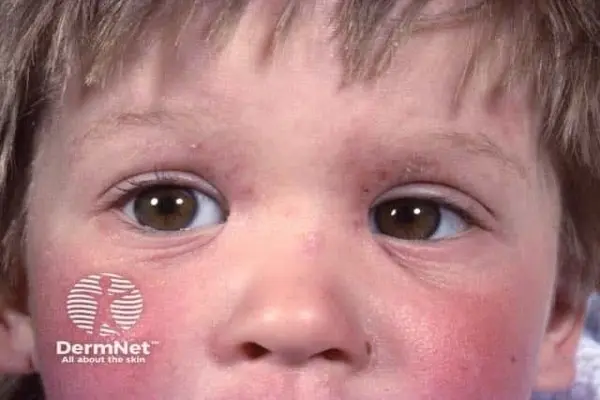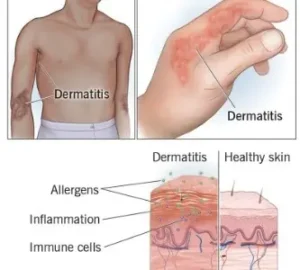
Dermatitis Treatment: Effective Solutions for Healthy Skin:
Dermatitis is a common skin condition that causes redness, irritation, and itching. It can occur due to various factors, including allergies, genetics, environmental triggers, and skin sensitivity. While dermatitis is not contagious, it can significantly impact a person’s comfort and confidence. Fortunately, effective treatments are available to manage and relieve its symptoms. In this guide, we will explore the best dermatitis treatments, home remedies, and skincare tips to help you achieve healthier skin.Understanding Dermatitis:
Dermatitis is a broad term that refers to inflammation of the skin.There are several types, including:
- Atopic Dermatitis (Eczema): A chronic condition that causes dry, itchy, and inflamed skin. It often runs in families and is linked to allergies and asthma.
- Contact Dermatitis: Occurs when the skin reacts to an allergen or irritant, such as chemicals, fragrances, or certain metals.
- Seborrheic Dermatitis: Affects areas with excess oil production, such as the scalp, face, and chest. It leads to dandruff-like flakes and redness.
- Nummular Dermatitis: Characterized by coin-shaped patches of irritated skin, often triggered by dry skin or allergens.
- Stasis Dermatitis: Develops due to poor circulation, often in the lower legs, causing swelling, redness, and sores.

Dermatitis Treatment Options:
Effective dermatitis treatment depends on the type and severity of the condition. Here are some proven options:1. Topical Treatments
- Moisturizers: Keeping the skin hydrated is crucial in managing dermatitis. Use fragrance-free and hypoallergenic creams or ointments.
- Corticosteroid Creams: These reduce inflammation and itching. They should be used as prescribed to avoid side effects.
- Calcineurin Inhibitors: Medications like tacrolimus and pimecrolimus help control immune responses that trigger flare-ups.
- Antifungal Creams: Used for seborrheic dermatitis to reduce yeast overgrowth on the skin.
2. Oral Medications
- Antihistamines: Help relieve itching, especially at night.
- Oral Corticosteroids: Used for severe cases but should be taken under medical supervision.
- Immunosuppressants: In cases of severe eczema, drugs like cyclosporine or methotrexate may be prescribed.
- Antibiotics: If the skin becomes infected due to scratching or open wounds.
3. Light Therapy (Phototherapy)
Exposure to controlled amounts of natural or artificial UV light can help reduce inflammation and itching. This is often recommended for chronic cases that do not respond well to topical treatments.Home Remedies for Dermatitis Relief :
While medical treatments are essential, home remedies can also help soothe symptoms and prevent flare-ups:- Aloe Vera Gel: Has anti-inflammatory properties that can calm irritated skin.
- Oatmeal Baths: Soaking in colloidal oatmeal can relieve itching and redness.
- Coconut Oil: Helps moisturize dry skin and reduce inflammation.
- Apple Cider Vinegar: Diluted apple cider vinegar may help balance skin pH and reduce irritation.
- Cold Compress: Applying a cool cloth to affected areas can provide immediate relief from itching and swelling.
Skincare Tips for Managing Dermatitis:
- Use Gentle Cleansers: Avoid harsh soaps and opt for mild, fragrance-free cleansers.
- Moisturize Daily: Apply a thick moisturizer immediately after bathing to lock in moisture.
- Avoid Triggers: Identify and eliminate irritants such as certain fabrics, detergents, or allergens.
- Wear Soft Clothing: Choose breathable, natural fabrics like cotton to minimize irritation.
- Manage Stress: Stress can trigger flare-ups, so practice relaxation techniques like meditation or yoga.
When to See a Dermatologist?
If your dermatitis symptoms persist despite home treatments, or if you experience severe itching, oozing, or infection, consult a dermatologist. Early intervention can prevent complications and improve your skin’s health.Conclusion:
Dermatitis can be frustrating, but with the right treatment and skincare routine, it is manageable. Whether through medical treatments, home remedies, or lifestyle changes, taking proactive steps can help you maintain healthy, irritation-free skin. If you need expert guidance, visit Dr. Kritika Derma Clinic for personalized dermatological care tailored to your skin’s needs.Book an appointment today and take the first step toward healthier skin!Image Credits & Attribution:
The images used on this website are sourced from reputable medical and dermatology organizations for educational purposes. We acknowledge and credit the following sources:
- DermNet NZ – Images used with permission. Visit DermNet NZ
- If you believe any image should be removed or properly credited, please contact us.
